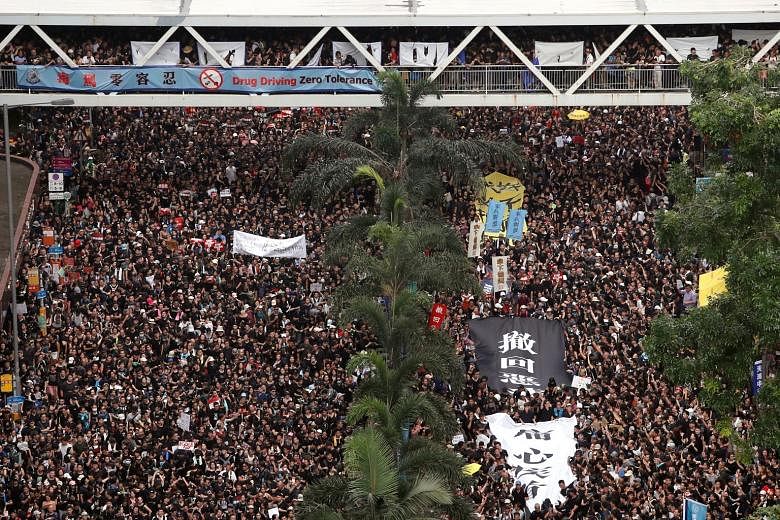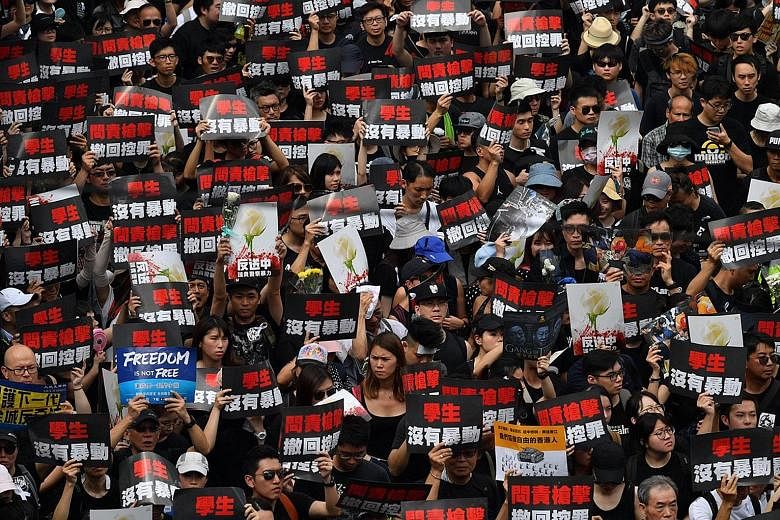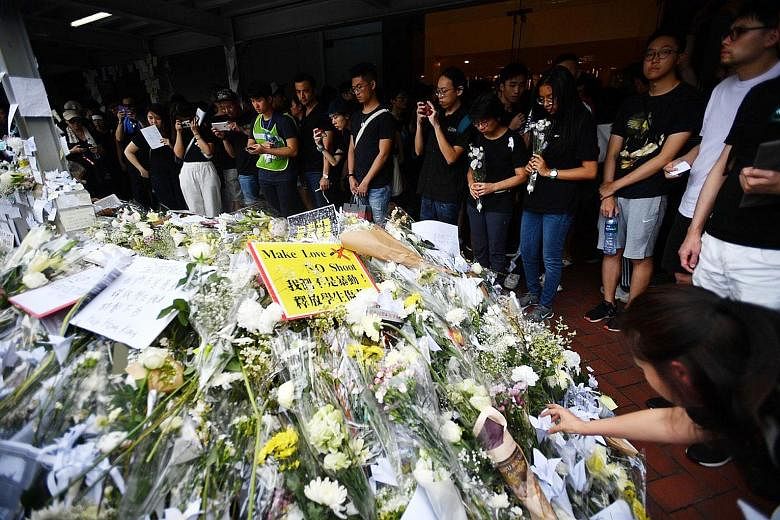Hong Kong leader Carrie Lam apologised yesterday to the city's residents and promised to serve them better after hundreds of thousands took to the streets once more to denounce a Bill that would allow extradition to China.
Her apology came after weeks of intense pressure to scrap proposed amendments to the law that many people in Hong Kong, from students to lawyers and business leaders, felt was another sign of Beijing's creeping interference in the city's rights and freedoms.
Mrs Lam in particular has faced strong criticism for her handling of the crisis and has been accused by protesters of being arrogant, ignorant of the wishes of Hong Kongers and aloof. The police have also been criticised for their heavy-handed tactics during the June 9 mass protest, which descended into violent clashes, and again last Wednesday, during which rubber bullets and tear gas were used against demonstrators.
"The Chief Executive admitted that the deficiencies in the government's work had led to substantial controversies and disputes in society, causing disappointment and grief among the people," said a government statement issued yesterday evening.
"The Chief Executive apologised to the people of Hong Kong for this and pledged to adopt a most sincere and humble attitude to accept criticisms and make improvements in serving the public."
Yesterday's protest was peaceful. It started in the afternoon from Victoria Park in Causeway Bay with a march to the government's headquarters about 3km away in Admiralty. Many of those taking part wore black, and the protest continued late into the night, with thousands gathered outside the government complex, using their mobile phones as torches and shouting "stay strong Hong Kong" and "withdraw" in Cantonese.
The government had announced on Saturday that it was postponing the Bill indefinitely. But many protesters felt this was not enough and went ahead with yesterday's protest to press for the Bill to be scrapped and for Mrs Lam to step down.
Rally organisers, the Civil Human Rights Front (CHRF), a coalition of pro-democracy politicians and groups, claimed that nearly two million people turned out for the rally.
But police said the number of protesters came to around 340,000.
Throughout the day, many held up signs that called out the police's heavy-handed treatment of protesters last week, as well as banners calling for Mrs Lam to quit.
Others lined the road holding red signs that read "stop killing us" in English and Chinese.

Student Herman Mo, 29, told The Straits Times that Mrs Lam needs to step down and take responsibility for the violent protests.
"The government has not taken the people's opinion into consideration when it should. I believe if Carrie Lam refuses to step down, we will continue to protest," he said.
Along the protest route, supply stands were set up, with volunteers giving out bottles of water, snacks and even umbrellas. Entire families with children were also seen heading towards Causeway Bay.
Ms Hebe Lau, who is in her 30s and works in finance, told The Straits Times she was at the rally to send a signal to the Hong Kong government that the Bill must be withdrawn. "Postponing is just an excuse to all Hong Kong citizens and cannot even be considered a victory at all," she said.
She was among thousands who gathered at Victoria Park in the sweltering heat to join the march.
Chinese state media remained largely silent yesterday, Agence France-Presse reported, with social media platforms scrubbed clean of any pictures or mentions of the rally.
Except for a short opinion piece in the People's Daily, Chinese state media - which has drummed up support for the Bill in recent weeks - kept mum. China's state broadcaster, CCTV, avoided the subject in its main news bulletins.
Protest leaders said the move to suspend the Bill indefinitely is simply an attempt to kick the issue into the long grass. "I believe the protest must carry on until we see the real withdrawal of the Bill," said vice-convener of the CHRF Bonnie Leung.
"As we have been lied to so many times, we don't believe in a mere suspension. If the whole Bill does not go through, they will dismantle it into smaller pieces and they would put it out one by one to get less notice from the public in order to pass it."
Organisers CHRF are also calling for a general strike today.
The Bill was first mooted in February following the murder of a Hong Kong woman by her Hong Konger boyfriend in Taiwan. The man, Chan Tong Kai, escaped prosecution in Taiwan by simply returning home as Hong Kong does not have an extradition agreement with Taiwan.
If passed, the Bill would also create a legal mechanism allowing for suspected criminals to be handed over to the mainland, which many fear could be used on political dissidents and activists.
The Hong Kong government said safeguards have been added since the Bill was tweaked after consultation, following pushback from critics. One of the six additional safeguards is raising the threshold for offences to be covered by extradition to imprisonment for seven years or more, from the initial three years.












